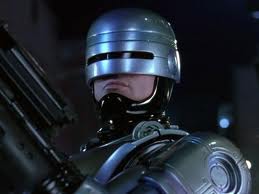 Welcome to Reboot Court, where we drag an upcoming film remake in front of the judge — that would be me — and determine whether or not a do-over is a good idea. Court is now in session …
Welcome to Reboot Court, where we drag an upcoming film remake in front of the judge — that would be me — and determine whether or not a do-over is a good idea. Court is now in session …
The original film: RoboCop (d. Paul Verhoeven, 1987)
The story: After being gunned down by a gang of merciless criminals, Detroit police officer Alex Murphy is rebuilt into a indestructible cyborg by Omni Consumer Products, a vast corporation that's been tasked with replacing the city's antiquated police force. But, uh-oh, this so-called RoboCop starts recovering memories of his former self.
Existing permutations: RoboCop 2, a gonzo 1990 sequel that was directed by Irvin Kershner (!) and written by Frank Miller (!!); RoboCop 3, which was PG-13, missing original lead Peter Weller and mostly ignored; and a couple of live-action and animated TV series.
Proposed incarnation: It's a full-on reboot.
Argument for: The original RoboCop was a critical and commercial success in its day (surprising, considering how crazy and violent and altogether Verhoeven-ian it is), but the franchise's legacy as a whole has already been good and tarnished by the string of lackluster follow-ups. The first film was stuffed full of social commentary dealing with the collapse of industrial America and the dangers of placing too much trust with mega-corporations that worship at the alter of the bottom line. Much of that commentary could be adapted nicely to today's Occupy Wall Street world. Visual effects have come a long way since '87, when Weller's only move was pretty much to "stomp around menacingly in a clunky metal suit," so RoboCop himself could be a lot more impressive on screen now. The new RoboCop is apparently going to be played by Joel Kinnaman, who was far and away the best thing about season one of AMC's aggravatingly awful murder mystery, The Killing.
Argument against: But being the best thing about The Killing is like being the best thing about getting cancer, and anything that serves as a reminder of it can't be good. A proper reboot of RoboCop would mean a return to the crazy violence of the first two films, but it's hard to imagine MGM won't water this down to try to appeal to the masses. I'm also not sure director Jose Padilha comprehends the key components of the RoboCop mythos. He says the new movie will ask the questions: "How do you make RoboCop? How do you slowly bring a guy to be a robot? How do you actually take humanity out of someone and how do you program a brain, so to speak, and how does that affect an individual?" Umm, is that really what anyone wants a new RoboCop movie to be about? Lastly, you may be able to replace Weller — after all, a metallic mask covers two-thirds of his face anyway — but how do you come up with a better villain than Kurtwood Smith's legendarily badass Clarence Boddiker? Answer: You don't.
The verdict: Much like Murphy was rebuilt following his apparent demise, so too can this franchise be. It'll be impossible for a remake to live up to the original, but I'm too intrigued by seeing what a near-future Detroit conjured up in 2012 Hollywood would look like to shoot this one down. If I was writing the reboot, the first thing I'd ask myself is: What would today's Detroit be like in ten years if, say, Wal-Mart or Halliburton (or Wal-Mart and Halliburton) were contracted by the federal government to come in and rebuild the city? And what would the 99-percenters do when they realized that the new robotic supercop that was supposed to protect them was secretly programmed to serve the one-percent? Those questions aren't too different thematically from some of the stuff tackled in the original film, but recent events could provide a jolt of modern context. Hopefully, Padilha won't be ignoring all of that in favor of detailing the psychological repercussions of reprogramming the human brain.











